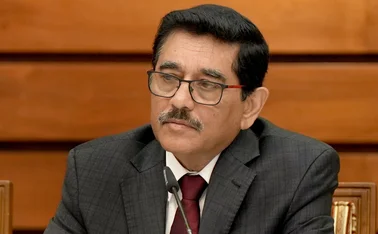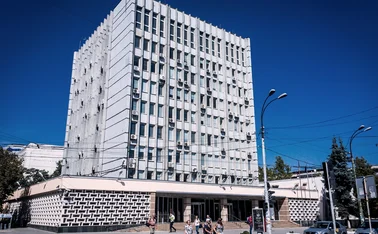
Ukrainian governor resigns in protest
Smolii says he has been target of “sustained political pressure” aimed at stopping him doing his duty

Ukraine’s central bank governor, Yakiv Smolii, has resigned in protest at what he called “sustained political pressure” that he said was aimed at preventing him from doing his job.
“I’ve submitted my resignation appeal to the President,” Smolii said on Twitter late on July 1. “This decision has been taken as an answer to systematic political pressure that denied fulfillment of my duties as the Governor. Let it be a warning for attempts to undermine institutional independence of the central bank.”
His resignation comes after what he has earlier described as a campaign against the central bank by one of the country’s richest, most politically influential men. He has publicly accused Ukrainian billionaire Ihor Kolomoisky of running a campaign in an attempt to regain control of PrivatBank, the country’s largest lender.
The ambassadors from the Group of 7 group of advanced economies released a public statement warning the government of president Volodymyr Zelensky not to withdraw support for the central bank’s reform of the financial sector.
Smolii served as acting governor of the National Bank of Ukraine for over a year after Valeria Gontareva resigned in 2017, having overseen a major clean-up of the banking sector. He was finally confirmed in the role by lawmakers in 2018.
Under Gontareva and Smolii, the NBU carried out wide-ranging reforms, including a major overhaul of its monetary policy framework, internal governance and methods of banking supervision. It closed a very large number of banks and financial firms, to the displeasure of many powerful Ukrainians.
The senior official at the NBU after Smolii is first deputy governor Kateryna Rozhkova, who led the banking clean-up under Gontareva. Rozhkova was the target of a lawsuit in 2019 that would have prevented her from carrying out her duties at the NBU.
One Ukrainian court granted the lawsuit before a higher tribunal overruled it. Smolii and Gontareva both accused Kolomoisky of being behind the action against Rozhkova.
Other politically influential Ukrainian businessmen have also been hostile to the NBU’s efforts to reform the country’s financial sector. But Smolii has frequently and publicly singled out Kolomoisky’s activities, without naming the oligarch but making it clear that he was referring to him, when protesting about political pressure on the central bank in the last year.
Ukraine’s previous government, led by president Petro Poroshenko, nationalised PrivatBank in December 2016, after the central bank said it had found evidence of massive fraud. A forensic audit by US-based firm Kroll found that Kolomoisky and his co-owner Gennady Bogolyubov had stolen almost all of the bank’s $5.5 billion assets, including many Ukrainians’ savings.
Kolomoisky returned to Ukraine in 2019 following the election of Zelensky as president. He attempted to regain control of the bank, but Smolii and other senior National Bank of Ukraine officials consistently spoke out against it.
Kolomoisky and Bogolyubov have consistently denied all wrongdoing with regard to PrivatBank, saying the evidence of theft and fraud was fabricated. But judges in the High Court in London found last year that there was a “good arguable case” that both men had stolen billions from the bank.
The International Monetary Fund’s managing director, Kristalina Georgieva, publicly warned that Ukraine would not receive vitally needed financial aid unless the government backed the central bank. Her intervention seemed to be decisive. In May, Ukrainian lawmakers voted for a law proposed by Zelensky’s government that prevented Kolomoisky from overturning the nationalisation of PrivatBank.
Several Ukrainian lawmakers have been widely reported as owing allegiance to Kolomoisky, who also owns the country’s most popular TV channel. President Zelensky previously worked for that TV channel, and several of his senior advisers are former employees of Kolomoisky.
Smolii and his predecessor, Gontareva, have frequently alleged that Kolomoisky has used lawsuits, attacks in the media, pressure from lawmakers and even physical intimidation. Gontareva has previously told Central Banking that Kolomoisky threatened her with violence when she was National Bank of Ukraine governor.
She has also said she believed him to have ordered the burning-down of her house in a Kyiv suburb, and a raid by armed men on her flat. Kolomoisky organised a heavily armed militia during the early stages of Ukraine’s war with Russian-backed separatists in the country’s east. Gontareva described Smolii’s resignation as a “disaster” for reform in Ukraine.
In the last year, several NBU officials including former deputy governor Oleksandr Pysaruk were arrested on corruption charges. Gontareva described the arrests as politically motivated and baseless, saying Pysaruk was one of the most honest officials she had met.
Further reading
Only users who have a paid subscription or are part of a corporate subscription are able to print or copy content.
To access these options, along with all other subscription benefits, please contact info@centralbanking.com or view our subscription options here: http://subscriptions.centralbanking.com/subscribe
You are currently unable to print this content. Please contact info@centralbanking.com to find out more.
You are currently unable to copy this content. Please contact info@centralbanking.com to find out more.
Copyright Infopro Digital Limited. All rights reserved.
As outlined in our terms and conditions, https://www.infopro-digital.com/terms-and-conditions/subscriptions/ (point 2.4), printing is limited to a single copy.
If you would like to purchase additional rights please email info@centralbanking.com
Copyright Infopro Digital Limited. All rights reserved.
You may share this content using our article tools. As outlined in our terms and conditions, https://www.infopro-digital.com/terms-and-conditions/subscriptions/ (clause 2.4), an Authorised User may only make one copy of the materials for their own personal use. You must also comply with the restrictions in clause 2.5.
If you would like to purchase additional rights please email info@centralbanking.com







